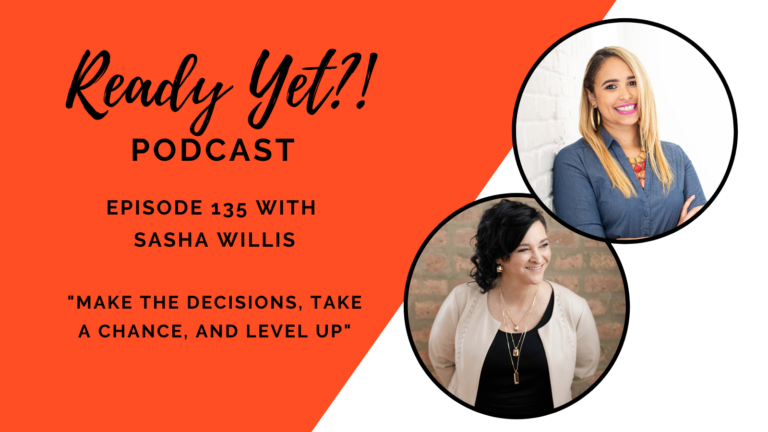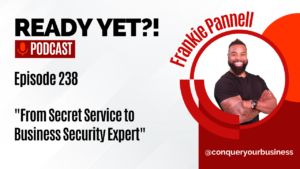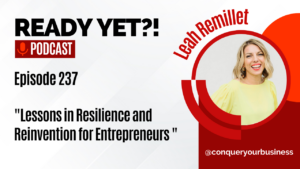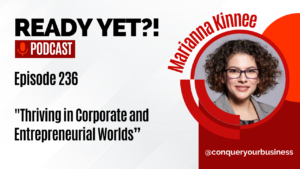MAKE THE DECISIONS, TAKE A CHANCE, AND LEVEL UP
We often look at a decision made in our business as binary – it’s either right or wrong. And this paralyzes so many of us! In reality we need to look at each business decision and figure out how well it worked, what we learned, and how this will help to move our business forward. My awesome guest today, Sasha Willis, is a business strategist who specializes in working with creative entrepreneurs. Join us as we discuss decision making, failing faster, and how to keep your business moving onwards.
Resources
Transcript
Erin Marcus:
Hi! I’m Erin Marcus, former corporate executive turned entrepreneur and founder and CEO of Conquer Your Business. Welcome to the Ready Yet?! podcast. We’re excited to bring you more than a hundred episodes of interviews and insights designed to help entrepreneurs get the financial and emotional freedom they need in order to build a business and a life they’re proud of.
Hello and welcome to this episode of the Ready Yet?! podcast. I’m excited to share conversation with you today. My guest today is Sasha Willis of By Sasha. So, how cool is that for a company name? We had a great conversation about entrepreneur journey and kind of balancing everything at once and doing all the things even before we hit record. It’s like, “Okay. Dog’s not barking, kid’s not screaming. Yeah, good luck.” So, I can’t wait to share more of this conversation with everybody else, but before we get into your journey, why don’t you tell everybody who you are and a little bit about what it is that you do.
Sasha Willis:
Sure. Well, thank you so much for having me. I’m really excited to be here. So, my business, By Sasha, I am a business strategist and I help creative women, entrepreneurs grow and scale their business and kind of go from struggling solopreneur to a savvy CEO, try to get them to consistent revenue every month and really just kind of put systems and things in place in their business that I find a lot of creative entrepreneurs don’t necessarily have a handle on. So, I help them kind of put those things in place so that they can run their business in a way that works for their life without being stressed out about it. So, that’s really what I focus on.
Erin Marcus:
Love it. And I love how you say run their business without being stressed out about it, because I just had this conversation with somebody, like there’s a really big difference between doing things that are kind of scary to push yourself. That’s one thing. But like if you are miserable in your business, that’s not really the point of all this.
Sasha Willis:
Yes. I’m glad you said that because having a business, we start businesses because we want to like what we’re doing and we want it to be enjoyable and we don’t really want to have to answer to anybody else. But when it starts becoming not fun anymore and you feel like you are working for your business as opposed to your business working for you, then it’s probably time for things to change.
Erin Marcus:
Yeah. I’ve said this for years, I left corporate in 2012 and the business that I have now, I started in 2019. And since 2019, since starting this business, absolutely there have been days where I’ve had appointments where I wish I didn’t have appointments. That’s normal. But I’ve never had a moment in this business where I wish I wasn’t doing this business.
Sasha Willis:
Yeah. If you’re like, I hate this job.
Erin Marcus:
And you gave yourself that job.
Sasha Willis:
Yeah. I mean, it’s like anything else. Of course, not every day is going to be sunshine and roses, but you shouldn’t like dread turning on your computer and like having to answer the client emails. That means something has to give. Either you need to outsource something or you need a better process in place or something like that. You should love your business at its core. You should love it.
Erin Marcus:
Right, because being scared and pushing yourself is a million percent necessary. But that’s a different feeling than I hate my life.
Sasha Willis:
A hundred percent agree.
Erin Marcus:
I love your journey because you have that ability where you’ve got the process side, but you really have that creative side too. So, how did you get here? Take the last 10 years of your life and narrow that down for us.
Sasha Willis:
My business has been a journey. I started in 2010 and I have a full-time job, so it’s always been on the side of my full-time job, but it started with me doing scrapbooking for people because people didn’t have photo albums anymore. That was when scrapbooking was like really big. So, I started doing that for other people because other people weren’t creative and they were like, “I want my pictures to look pretty.”
Erin Marcus:
Mine would just be rows of pictures.
Sasha Willis:
Yeah. So, I started doing that for people, which turned into me focusing more on stationery and design type stuff. So, I love a theme party. Like I live for a theme party, so I would do like the big elaborate dessert tables and stuff like that. And primarily, wedding stationery. I did that all the way up until 2017 when I got pregnant with my son. I stopped doing the event styling when I was pregnant. I just physically couldn’t do it anymore. And then I took a break from the wedding stationery and I picked it back up after my son was born. And I just realized I did not have the time or patience to deal with couples anymore and it wasn’t fun for me anymore. So, I transitioned into more of selling product-based stuff and kind of women empowerment type things.
When I was doing that, that led into a lot of my business friends saying, “Have you done all this? Like, can you help me with my business? Like I really just want to like design, or I want to do XYZ in my business, but I’m burnt out or I feel stressed all the time, like can you help me because you do all the things and you don’t seem stressed out about any of it?” And so, that’s when I made the pivot into just focusing on business strategy because I am that rare creative. I went to business school. I have my background in HR. My day job is in HR, so I’m very much in the business world, but I understand how creative people think and how we have all of the ideas and we just throw things out there without any real, like backend of planning or anything like that.
Erin Marcus:
One of the things I’d love for you to dive into, because I think this is very interesting, kind of like our earlier discussion about the difference between dreading what you’re doing for a living and fear. Like fear is okay, but dread is not. As you talk about your journey, you’ve iterated what you’ve done, but there’s a calmness around it. Maybe it’s just general demeanor. But there’s a difference to me in what you’re talking about where I was done with this, so I did that. And then I was done with that so I did the next thing. That’s very different than when you hear people hop from idea to idea to idea to idea for not a great reason. Like they didn’t actually try or they considered a failure too soon. How did you know the difference between I’m ready for my next iteration or I’m giving up too soon because of a not great reason to give up?
Sasha Willis:
Yeah, I don’t think I gave up in any aspect of my business. It was very much, I did each of them for years at a time. For me, making those pivots in my business and I never changed the name of my business. I kept it the same and just kind of made slight changes along the way. But for me, it was how my business fit into my life. Again, going back to what I was saying earlier, my business is meant to kind of serve me and the lifestyle that I want to have. It’s not meant to cause me more stress or give me more things.
Erin Marcus:
Suck the life out of you.
Sasha Willis:
Yeah. It’s not meant to just add more to my plate. So, when I would get to a point where I was just would say to myself, “I don’t like doing this anymore. This doesn’t seem to be fulfilling me or it’s not making me happy.” In some cases, like especially when I went from wedding stationery to selling products, it was one of my best years ever selling wedding stationery. I could have continued on that route and been just fine. I had made plenty of contacts in the industry. Like I was getting clients without really even having to ask. They would just bring them to me. I just didn’t find it enjoyable anymore. I didn’t like the last minute of having to make changes to people’s escort cards and sending it off to a printer and things like that. And so, that was just isn’t serving my life anymore and I need to switch to something that’s better.
Erin Marcus:
I think one of the things that you’ve done, and maybe it’s because you had the full-time job, but I would argue that’s almost irrelevant, the safety net of the full-time job might have allowed you to make changes, but truthfully, those changes were in service to your business.
Sasha Willis:
Yeah. I mean, my job definitely gives me stability. I get a steady paycheck, so it does help. It’s not as scary to make changes because I’m not as dependent on the income that comes in for my business, but for me, I just don’t want to be in something that I don’t like doing anymore.
Erin Marcus:
That’s like the point, like if you just stick with what lights you up, but you got to do the work with what lights you up.
Sasha Willis:
Yeah. I learned something from every iteration of my business. I took things from each part that worked and continued it on into the next part of my business and the things that I realized that that didn’t work as well when I was doing it, then if I tried this way, maybe it’ll work this time or I don’t need to do that again. So, I learned things along the way that has only improved myself as a business owner because I’ve tried so many different things and I’m not afraid to put something out there and do the work behind putting something out there to see, ‘Okay. What’s the reaction going to be? How do people respond to this?’ And then decide whether or not it makes sense to continue doing that stuff. Being a business owner is a lot about risk. I mean, it’s taking chances and figuring out what’s going to work, what’s not going to work, and then just constantly like leveling that.
Erin Marcus:
It’s so true and it’s so timely. Again, this conversation that I had right before you and I started here was about how fear shows up as indecision and fear shows up. One of the way fear shows up as is indecision and being afraid to make the wrong decision. And I would argue that every single decision I make is right and every single decision I make is wrong because there is no black and white. Like there just is the next step that I’m attempting to take and you learn from it. You take that information and you take one more step and that step is part right and part wrong.
Sasha Willis:
Well, because either way, if you make the right decision, you make the wrong decision, you’re moving. If you make no decision, you’re going to stay in the same place and nothing will change. And so, you have to be willing to take a step somewhere and be okay with even if it’s the wrong decision because you’ll learn something out of it, you’ll figure out, yes, this was the wrong one and I don’t need to do that again. Let’s try the opposite. Like let’s do something different.
Erin Marcus:
Well, removing that and in the way you are speaking about it is without the emotional attachment to whether or not it was right or wrong. And that nonbinary thinking is what works so well. Like I don’t interpret something as a success. I get excited when it works, but it’s not like, ‘Oh, that was the greatest success ever,’ because there’s always room for improvement. Okay, maybe some things were a bigger failure. I’m not equally unattached to those.
Sasha Willis:
Yeah. I’m a very, I guess rational person. You have to be able to remove the fear from it, but you have to be able to remove kind of your thinking that either way is right or wrong, and that this is the best decision or this makes the most sense for me to do right now. Because that helps, like I said, push your business forward. If you’re always scared that you’re going to do something wrong, it limits the things that you’re willing to do because you think it’s going to be the wrong choice. Like you said, I don’t think there’s anything inherently right or wrong about the decisions that we make. It’s just a lesson that we’re going to learn, and everything is going to teach us something about what we can do better or how we can improve or what not to do or how not to get an outcome. It’s going to help us with something in some way. So, if you go into it, like not even thinking like, ‘Oh, this is going to fail,’ but if you go into it like, ‘Okay. The best possible outcome I can get is XYZ.’ If that doesn’t happen, then at the very least, I’ve learned something like it’s not something I did wrong, I didn’t fail, but I’ve learned something and now what do I do with that information?
Erin Marcus:
What I have found as my business has grown and grown faster, the faster I can get through that entire process is the number one thing that determines my success. So, the things that didn’t work that previously would’ve thrown me for several months then weeks, the “failures,” or bad decisions, the faster you can let them go, glean your nugget, take the next step, that’s the direct level of the speed of your success.
Sasha Willis:
Yeah. It’s only just going to help you keep leveling up and keep growing and pushing forward. A lot of staying stagnant in business is because we’re scared of making those choices and those decisions and it’s really about essentially picking a road and figuring out which way we’re going. And then if that road is a dead end, we go to a different one. That’s really what it is.
Erin Marcus:
As I’m thinking about what we’re both saying here, I guess, and I just haven’t seemed to come across it a situation where bad decision after bad decision, like the pattern doesn’t seem to go that way. Have you notice that? Like my decisions do get step by step better. I haven’t really caught myself in a pattern of from bad to worse to worst.
Sasha Willis:
I think where a lot of people think they make bad decisions is because you don’t know what you don’t know. If you find yourself making bad decision after bad decision, that’s when it might be time to ask for help. There is someone who is a step ahead of you or has been where you’ve been before who can help you through that and that will get you to that next better decision. So, that way at the very least you’ll be able to see the road. The forest isn’t in the way, you’ll be able to get there and not just keep making these decisions that don’t make sense. That comes from a place of just essentially ignorance a lot of times in what we’re doing in business.
Erin Marcus:
I think that’s a really good point. So, get rid of the binary thinking of success or failure. Make faster decisions, take faster action, learn from them faster. And truthfully, if you find yourself in a situation where you’ve now done a couple things in a row that got you the opposite effect of what you’re looking for, find a person who knows how to do it and ask them.
Sasha Willis:
Yes. And that’s where people like me come in.
Erin Marcus:
Me too.
Love what you’re learning here and interested in more? Check out conqueryourbusiness.com to get immediate access to all sorts of additional resources and stay updated on our upcoming training events.
I do that in my own business. Find the person who has walked the path you want to walk and learn from their path. I tell people, I tell my clients this, it’s something that I do. Don’t just listen to what I’m telling you, watch what I’m doing. I probably learned more watching my mentors run their business than when I formally attend their training calls.
Sasha Willis:
I had a business friend of mine who had heard from her mentor, when you are whatever stage you are in your business, you want to be essentially the dumbest person in the room because that’s how you learn. You want to be in the room where people are ahead of you and above you in business because they’re going to show you and teach you how to get to their level. You don’t want to be the smartest person in the room when it comes to your business.
Erin Marcus:
You know what I’ve learned also recently as I make my next steps forward, it’s not just that they’re going to show you the path. There’s something about how you need to see yourself. So, my next year is my goal is my million-dollar year. And so, I have put myself in a room where it feels like, I mean, I’m guessing, but it feels like everyone’s ahead of me because truthfully, I want to know that a millionaire looks like me.
Sasha Willis:
Yeah.
Erin Marcus:
Right? Like it’s not just how to get there, but who it is. These are regular normal. They’re not fancy people because I’m not a fancy person, but in my head somewhere I’m thinking millionaires are all fancy.
Sasha Willis:
That’s every stage. I mean, when you’re first starting out, you’re trying to get to that $5,000 that you get in your business. That first step, you’re like, “Who’s making this money? I don’t know how to do that.” And every step that you get, then you get like the 20K months and then the 30K and as you keep moving up, you start realizing like, ‘Oh, these people live their lives just like me.’
Erin Marcus:
Look at that. Everyone’s just normal. It’s crazy how that sneaks in on us too. I wasn’t expecting that to be the problem.
Sasha Willis:
Because something just seems so unattainable at some point for us. And that when we get to places, I think it’s important to see people that look like you who can achieve what you want to achieve.
And myself, I’m a Puerto Rican woman, so it’s important for me to see people who look like me, black and brown women who look the way I do, who are achieving those things because we don’t see it that often. So, it’s hard to picture yourself in those spaces when you don’t see people that look like you. So, normalizing and helping women along that journey and saying, ‘Yeah, there’s people that look just like us, like we can do it too.’ It helps with that mindset aspect of it of like, it might seem hard but other people have done it, so like I should be able to do it too.
Erin Marcus:
Yeah. It’s that balance between, as a business owner, everything we’re doing hasn’t been created before because you’re making it up. Right? So, to some extent, there’s that visionary piece. In other businesses, in corporate, they look at what happened before to predict what’s going to happen in the future. And everything I’ve accomplished never happened before. So, it makes it a little hard. You don’t want to be looking in the rearview mirror as an entrepreneur. So, it’s this mixture of finding people who can pull you forward because they’ve walked the path and then realizing that yes, you are creating this.
Sasha Willis:
Yeah. It’s more about looking at the journey that people are taking versus not following their exact like ABC steps, but like, okay, how did they get here? What decisions did they have to make? What were they thinking about when they made those decisions? And looking at it that way as like, ‘Okay. First, I’m going to do this and then I need to do that.’ It’s so much linear.
Erin Marcus:
So, with all your iterations and balancing children, family, full-time job, entrepreneur, creative entrepreneur, if we were going to shortcut someone’s learning curve, that’s my favorite thing to do. If you just don’t do what I did, you’ll be better off. Right? Don’t do it this way, you’ll be fine. What were some of the things that you’ve tried that we could warn people off? Don’t do that. I love sharing the failures and it’s so funny because every successful person that I ask this question, they’re like, how many do we have time for?
Sasha Willis:
I spent a lot of money on my business in places I didn’t need to spend money. So, if I had to do it again, I probably would’ve looked at things more in depth. I think the nature of any creative is that we just have shiny object syndrome. And if we’re like, ‘Oh, that looks neat and that looks like it will work. I need that.’ It’s spending money like that. I will say like I wouldn’t not do it again because the money aspect of it, but I also know now like where I need to spend my money on certain things. And more of it was like on the people aspect of stuff than hiring people to help me versus like buying physical things that I thought I needed for my business. So, I probably would’ve done that. I think it’s important and this wasn’t a mistake I made, but I think sticking to something long enough. There are definitely times, especially early in my business, I’m the only person in my family who has a business. And so, being scared of failure and being scared of like this isn’t going to work and do I need to like change something right now to make it work? I was fortunate that I stuck through things long enough until they worked. But not letting go of something too quickly I think is a mistake a lot of people make.
Luckily, I started my business before all this was a thing, but social media will make you think like you’re supposed to be making six-figure months in your first six months of business. So, I didn’t have that pressure. I didn’t see that. So, luckily, I didn’t feel that imposter syndrome. I’m not there yet. But I think kind of censoring that out and not listening to that as much because it will be discouraging.
Erin Marcus:
Learning the difference. For me, it feels physical in nature, but learning the difference between iterate quick, make your better decision, giving up too soon. It sounds like we’re asking people to do the impossible. We want you to iterate to stay ahead and make fast decisions, but don’t give up too soon. And you have to start to learn how to interpret the data you get in. Right? You start to interpret what you’re learning to see where, you know, am I giving up too soon or is it time to make a different decision?
Sasha Willis:
I think it’s really important to early on to decide if you truly want to have a business because a lot of people get pushed into having a business because someone told them the hobby that they have, they’re good at and they can make money at it without really realizing all of the work that goes into a business.
Erin Marcus:
You want to ruin how you feel about your hobby? Turn it into a business. It’s not so much fun anymore.
Sasha Willis:
A lot of people are just like, ‘Oh, people told me I should start selling this or I should start doing this because I’m good at it, and I don’t know what to charge and I don’t know XYZ but here’s my business. I hope it works.” That’s fine for like the first couple of months, but then if you want to get serious about it, then you need to make that decision early on that you’re going to learn like what it means to be a business owner and how to do all of the backend things that business owners do.
Erin Marcus:
Yeah, I say like, you put all your time and money and effort into doing the thing that your business does, but how much time, money, and effort have you put into learning how to run a business because they have nothing to do with each other.
Sasha Willis:
Yes. People fail to I guess realize is that as your business grows, you’re going to get further and further away from doing what the business actually does because at some point, you turn into someone who’s just managing your business.
Erin Marcus:
Right. And for some of us that is the goal. And for some people that is the horror. My thing is you are absolutely allowed to have whatever version of business you want. You want a hobby business, you want a big corporate, whatever it is, as long as you choose instead of just letting it happen and feeling–
Sasha Willis:
intentional.
Erin Marcus:
Yeah. What’s your intention? What do you want?
Sasha Willis:
Yeah. I have a friend who has a graphic design business and she only wants to design and her graphic design agency is successful. And she hired a COO and she said, “I’m going to hire them to take it over so I can just design like, this is still my business, but I just want to design, I don’t want to deal with clients. I don’t want to deal with like the onboarding, the off onboarding, any of that.” So, she hired that piece out.
Erin Marcus:
Hire for the rest of it, a hundred million percent.
So, if people want to continue this conversation with you and I highly recommend that they do, what is the best way for them to get ahold of you?
Sasha Willis:
So, you can find me on Instagram at Strategy by Sasha. My website is by-sasha.com. And then if you’re on Facebook, I have Facebook group for Strategy for Creatives and it’s a nice little community where I drop tidbits and have conversations and give advice and all of that good stuff. And I also have a podcast called Strategy for Creatives.
Erin Marcus:
Is the Strategy for Creatives your Facebook group?
Sasha Willis:
Yes.
Erin Marcus:
Great. That sounds like a fantastic place to be.
Sasha Willis:
Yes.
Erin Marcus:
Highly recommend. Awesome. Well, thank you for sharing your story and your insights and your smile and your positive energy because I absolutely agree. Like we didn’t do this to be miserable. Hard is fine, miserable is not. So, thank you. And as always, great chatting with you.
Sasha Willis:
Thank you so much.
Erin Marcus:
I hope you enjoyed this episode of the Ready Yet?! podcast. I truly enjoy bringing these stories of success and inspiration to you. Please join us in our mission to empower entrepreneurs to be in charge of their businesses and in charge of their lives by sharing this with anyone you know who would benefit from our tactical and motivating advice, leaving us a review and letting us know if there are any particular topics you would really appreciate hearing about. See you next time.





